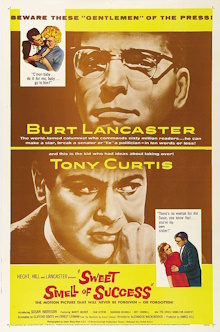With its fast-paced dialogue and strange world in newspaper columnists are seemingly all powerful, this was a difficult title to get into initially. But I appreciated the attempt to film this unusual and complex subject and having both main characters be total sleazeballs is an amazingly bold decision. Even apart from the world itself, there are so many things in here that are so weird including J.J.’s obsession with his sister, but I loved it all, especially the savage pettiness of the characters and how it never lets up right up to the end.
Sidney Falco is a press agent in New York who accepts payment from performing acts in exchange for promoting them. His primary means of doing so stems from his relationship with J.J. Hunsecker, an influential columnist. Hunsecker has stopped writing about Falco’s clients however, threatening his livelihood, because he has failed at one of his assigned tasks. Hunsecker lives with his sister Susan and hates the idea of her ever leaving. Therefore he wants to break up her relationship with a musician Steve Dallas. Visiting his usual haunts, he hears from a cigarette girl Rita about how her refusing to sleep with Leo Bartha, another columnist, is putting her job at risk. He tries to use this information to blackmail Barta into a smear column against Dallas but fails. He tries with yet another columnist Otis Elwell and succeeds by getting Rita to sleep with him. The smear accusing Dallas of smoking marijuana gets his quintet fired from their club. Hunsecker uses this leverage to gain power about Dallas in front of his sister. But as Falco predicts, Dallas has too much integrity to submit to Hunsecker and blows up at him instead.
This film portrays a world that is almost impossible for us to believe in today. As the opening shot of a fleet of trucks distributing them establishes, here newspapers are still a big deal and a few lines of text from a critic can make or break careers. I’m not convinced about the economics of that scenario. How much can performers in a club earn anyway? And their press agents like Falco surely only get a small fraction of that. Does every club performer have their own agent? Hunsecker is so powerful that he even has US senators vying for his attention. Still, it’s a fascinating world to get a peek into, especially since the film dives deep into the filthy muck with no hesitation whatsoever. Sex, blackmail, dirty tricks, corrupt cops, it has it all. Tony Curtis is fantastic as Falco and it’s doubly impressive that the actor deliberately sought out the role of such a despicable character to prove that he can really act. Burt Lancaster is great too as Hunsecker. It’s not everyday that you get a character who has a professorial demeanor but is still a complete bully. Apparently even director Alexander Mackendrick was intimidated by him and feared being fired from the project by the famous actor.
The cynicism on display here is impressive even by modern standards. It’s one thing for Falco to shamelessly lie about his ability to promote his clients or to plant evidence against Dallas. It’s another thing for him to predict the latter’s moral integrity and weaponize it against him. Hunsecker similarly manipulates his own sister, relying on her better nature to make her feel guilty about the relationship he opposes. Then when Dallas calls him out about it, Hunsecker seems genuinely outraged, not just for himself, but on behalf of the millions of readers who read his column and presumably support his views. The righteous sanctimony is glorious to behold because he appears to sincerely believe in it himself. And it’s not just Falco and Hunsecker. Almost everyone else in the film is equally shady or at least morally grey, down to Falco’s secretary who is concerned about his lack of ethics but doesn’t stand up against him.
On top of all that, this film captures a specific, long gone era of journalism which tickles my personal fancies in just the right way. It was a major box office failure because audiences did not like Curtis portraying so dastardly a character. Critics loved it and modern critics love it even more. I wish it had gone a little farther, by having Falco point out how weird Hunsecker’s obsessive control of his sister is for example. Director Alexander Mackendrick never made another significant film after this. He might have had more clout to pursue interesting projects if this had made money but it seems like he never had much of a career after this early failure.
